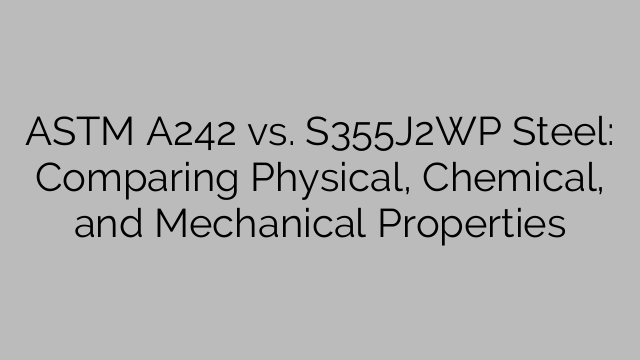ASTM A242 and S355J2WP steel are two commonly used materials in the construction industry. Both offer excellent weathering resistance and are suitable for outdoor applications, but they have their own unique characteristics. In this article, we will compare the physical, chemical, and mechanical properties of ASTM A242 and S355J2WP steel to give you a better understanding of their differences.
Physical Properties:
ASTM A242 and S355J2WP steel have similar physical properties, including density, melting point, and thermal expansion. The density of ASTM A242 steel is 7850 kg/m³, while S355J2WP steel has a slightly higher density of 7860 kg/m³. The melting point for both materials is around 1420-1460°C (2588-2660°F). In terms of thermal expansion, both ASTM A242 and S355J2WP steel have a coefficient of approximately 12.5 µm/m°C (6.94 µin/in°F), which means they expand and contract at similar rates when subjected to temperature changes.
Chemical Composition:
When it comes to chemical composition, ASTM A242 and S355J2WP steel differ slightly. ASTM A242 steel contains elements like copper, chromium, nickel, and phosphorus, which give it enhanced atmospheric corrosion resistance. On the other hand, S355J2WP steel primarily consists of iron, carbon, manganese, silicon, and copper. The copper content in both materials plays an essential role in their weathering properties, as it forms a protective patina on the surface that prevents further corrosion.
Mechanical Properties:
The mechanical properties of ASTM A242 and S355J2WP steel are another area of distinction. ASTM A242 steel has a minimum yield strength of 50,000 PSI (345 MPa) and a minimum tensile strength of 70,000 PSI (483 MPa). It offers excellent weldability, formability, and machinability. S355J2WP steel, on the other hand, has a higher minimum yield strength of 355 MPa and a minimum tensile strength of 490-630 MPa. It also offers good weldability and formability, making it suitable for structural applications.
Both materials have a similar elongation percentage, which is a measure of ductility. ASTM A242 steel has an elongation of 17% while S355J2WP steel has an elongation between 17-20%. This ductility allows the materials to withstand deformation and absorb energy without fracturing during use.
Conclusion:
In summary, ASTM A242 and S355J2WP steel are both excellent choices for outdoor applications due to their weathering resistance. ASTM A242 steel offers enhanced atmospheric corrosion resistance, while S355J2WP steel has slightly higher yield and tensile strength. The differences in their chemical compositions contribute to their unique properties, with ASTM A242 steel containing additional elements for corrosion resistance. Ultimately, the selection between these two materials will depend on the specific requirements of your project.

